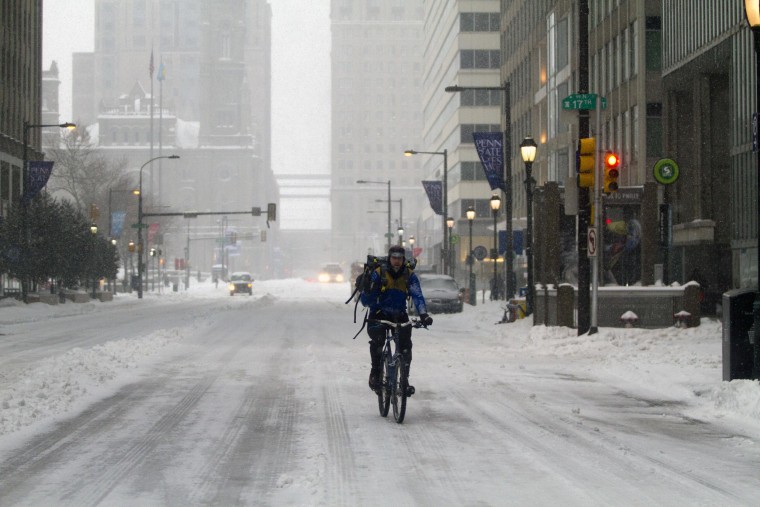Old Man Winter has been a convenient foil for the recent spate of bad economic news, but he shouldn't be shouldering all the blame.
True, the elements have not been cooperative, particularly in the Northeast, and are causing more than their fair share of damage as the U.S. tries to accelerate its nascent recovery.
Economists, though, are coming to grips with an even colder reality, namely that expectations for sharply accelerating growth in 2014 may have to be tamped down.
"The mantra of late when it comes to assessing the high frequency economic data has been to blame it on the weather," Tom Porcelli, chief U.S. economist at RBC Capital Markets, said in a report. "But it seems to us that folks are all too eager to dismiss what could potentially be some real underlying weakness."
Porcelli notes that some activity measures like the Philadelphia Fed index legitimately could be written off as bad weather. But others, such as nonfarm payrolls, the Institute for Supply Manufacturing, retail sales and even housing suggest that something more fundamental is at play. Moreover, parts of the economy that really should have taken a weather hit, such as construction hiring, actually improved, while weather-resistant areas like online shopping deteriorated.
That doesn't mean that a significant downturn is coming — just that expectations may have outpaced reality.
"This weakness is merely a reversion to the mean following rates of growth that, given the fundamentals of the U.S. economy, were never sustainable to begin with," Porcelli said.
"It may come as a shock to mainstream economists that it is cold and snowy in the Northeastern United States during the December-February time frame. However, worse than expected winter weather ... cannot adequately account for stumbling GDP across the developed world."
Indeed, several economists have cut what had been fairly robust expectations for first-quarter growth after the inventory-fueled jump of 4 percent in the fourth quarter of 2013. JPMorgan, for instance, reduced its outlook from 2.5 percent to 2 percent, though Wall Street forecasts still maintain a solid year is ahead.
As for the market, investor sentiment has seesawed.January's pullback led to February's profit as traders stepped in to buy the dips.
Further deterioration in the economic data might make the Federal Reserve rethink its decision to reduce its monthly bond-buying program — quantitative easing — in $10 billion-per-meeting increments, a possibility for which traders seem to be preparing.
The Fed likely will be looking at next week's nonfarm payrolls data even more closely than usual. The news of late has been fairly awful, with December and January averaging just 113,000 net new jobs.
TrimTabs, which tracks market and economic data, said income tax withholdings have increased just 5.3 percent annualized, which it attributed more to "bonus shifting" from late 2013 into early 2014 than underlying payroll strength.
"In addition, credit indicators, unemployment claims data, housing data, and regional manufacturing data suggest the much-anticipated economic acceleration is nowhere in sight," TrimTabs CEO David Santschi said in his weekly report. "If the economy deteriorates or asset prices tumble, we expect the Federal Reserve to be quick to stop 'tapering,' much as it cranked up the printing presses soon after QE1 and QE2 ended."
That would be more likely to happen after realization hits that winter simply can't explain away the economic weakness.
"It may come as a shock to mainstream economists that it is cold and snowy in the Northeastern United States during the December-February time frame," economist Michael Pento said in an analysis. "However, worse than expected winter weather in certain parts of the U.S. cannot adequately account for stumbling GDP across the developed world and crumbling securities in emerging markets."
Pento ascribes the economic inconsistencies to a world trying to adjust to changing policies from the Fed and other central banks that have created uncertainty and misallocation of resources across the globe.
